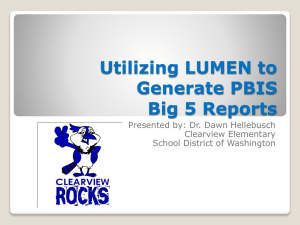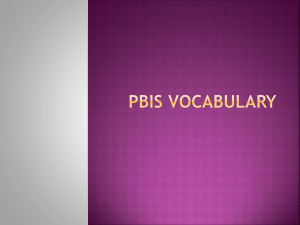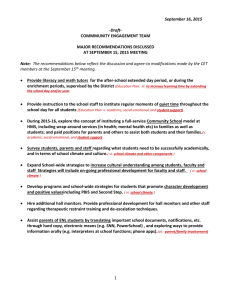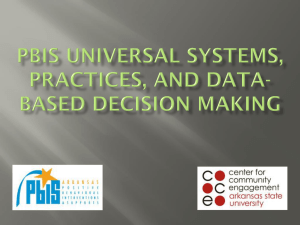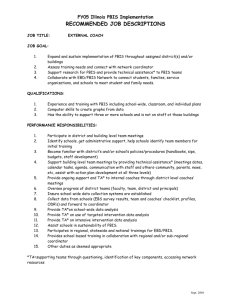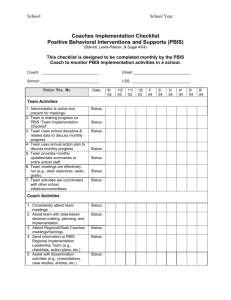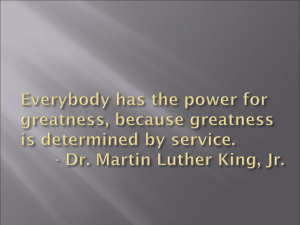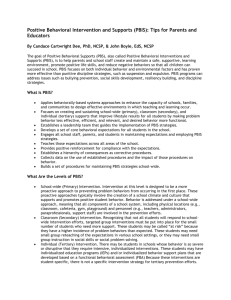PBIS Handbook 2015-2016 - Edgewood Independent School District
advertisement
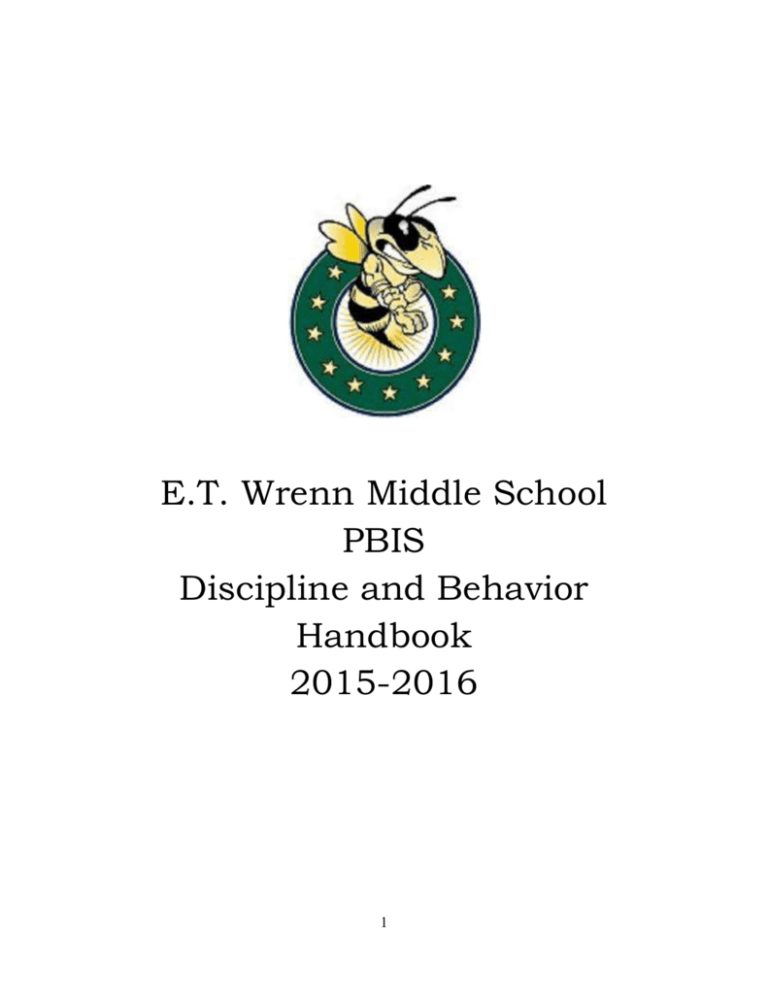
E.T. Wrenn Middle School PBIS Discipline and Behavior Handbook 2015-2016 1 Table of Contents What is PBIS? Positive Behavior Support Defined PBIS Timeline Systems Approach Campus & Vision Beliefs PBS Guiding Principles Three Tiered Model Motto Guidelines for Success Behavior Matrix Staff Behaviors School-Wide Corrective and Discipline Procedures ISS Uniform Policy Restroom Transition Activities Incentives 2 3 4 6 8 10 11 12 13 14 17 19 22 26 27 29 30 31 What is PBIS? PBIS stands for Positive Behavior Interventions and Supports. Established in 2001 in response to Texas Legislation, the Texas Behavior Support Initiative (TBSI) was designed to build capacity in Texas schools for the provision of positive behavior support (PBIS) to all students. The goal of PBIS is to enhance the capacity of schools to educate all students, especially students with challenging behaviors by adopting a sustained, positive preventative, and instructional approach to school-wide discipline and behavior management. This approach focuses on giving priority to teaching and encouraging positive school-wide behavioral expectations, and increasing school capacity to support sustained use of empirically validated practices. The purpose of developing a School-Wide Positive Behavior Support (SW-PBS) is to create a systematic approach to that will help the campus achieve academic and social goals. The systems approach considers the needs of the individual student, classroom management and instruction, schoolwide behavioral expectations and supports, and district support. The purpose of this handbook is to develop an understanding of the rules and expectations at E.T. Wrenn Middle School. The handbook is a tool that should be utilized throughout the school year. Positive Behavior Support Defined 3 School-wide Positive Behavior Support (SW-PBS) is rooted in the behavioral or behavior analytic perspective in which it is assumed that behavior is learned and is related to immediate social environmental factors, and can be changed. SW-PBS is based on the idea that students learn appropriate behavior in the same way they learn to read – through instruction, practice, feedback, and encouragement. Key features of SW-PBS include: -based implementation -based information for decision-making, monitoring, and evaluation Why is it so important to focus on teaching positive social behaviors? In the past, school-wide discipline has focused mainly on reacting to specific student misbehavior by implementing punishment-based strategies including reprimands, loss of privileges, office referrals, suspensions, and expulsions. Research has shown that the implementation of punishment, especially when it is used inconsistently and in the absence of other positive strategies, is ineffective. Introducing, modeling, and reinforcing positive social behavior is an important step of a student's educational experience. Teaching behavioral expectations and rewarding 4 students for following them is a much more positive approach than waiting for misbehavior to occur before responding. The purpose of school-wide PBIS is to establish a climate in which appropriate behavior is the norm. PBIS Timeline 5 2008-2009 Staff commitment PBIS Team created Common Area Posters-teacher made Parent/Staff/Student Surveys 1st year PBIS training @ Region 20 2009-2010…continued w/above Blue line in hallways CHAMPS Training Common Area Posters-professional Parent/Staff/Student Surveys Caught Being Great Hornet Bucks/Hornet Store Teachers Caught Being Great 2nd year training @ Region 20 2010-2011…continued w/above Hornets’ Nest VIP lunch passes “Caught Being Great” Volume 1 for teachers 3rd year training @ Region 20 2011-2012…continued w/above HIVE Hornet Tokens in denominations PBIS Handbook 2013-2014…continued w/above Presentation at PBIS conference Improve Hornet Store 2014-2015…continued w/above ABCD Awards Continued Training @Region 20 6 Sharing discipline data on a monthly basis, utilizing the P: drive so that information is accessible Systems Approach 7 An organization is a group of individuals who behave together to achieve a common goal. Systems are needed to support the collective use of best practices by individuals within the organization. The school-wide PBIS process emphasizes the creation of systems that support the adoption and durable implementation of evidence-based practices and procedures, and fit within on-going school reform efforts. An interactive approach that includes opportunities to correct and improve four key elements is used in school-wide PBIS focusing on: 1) Outcomes, 2) Data, 3) Practices, and 4) Systems. The diagram below illustrates how these key elements work together to build a sustainable system: • Outcomes: academic and behavior targets that are endorsed and emphasized by students, families, and educators. (What is important to each particular learning community?) • Practices: interventions and strategies that are evidence based. (How will you reach the goals?) • Data: information that is used to identify status, need for change, and effects of interventions. (What data will you use to support your success or barriers?) • Systems: supports that are needed to enable the accurate and durable implementation of the practices of PBIS. (What durable systems can be implemented that will sustain this over the long haul?) 8 9 Campus Vision & Beliefs The vision of our campus is to be a premier middle school preparing students for any challenge in life by guaranteeing excellent education to all students. Our goal is to create an inviting and safe campus by establishing guidelines that will achieve success. We the stakeholders, including administration, teachers, support staff, paraprofessionals, custodial staff and parents are responsible for managing student behavior. We will clearly define our expectations for responsible behavior in all school settings. We will teach students the expectations routinely, model behavior expectations and be consistent in the implementation so that students will be able to self-manage their behavior. We will provide positive feedback to students when they are meeting expectations and following the guidelines for success and we will provide rewards. We will view minor misbehaviors as teaching opportunities, and respond calmly and consistently with corrections or consequences. We will work collaboratively to solve behavior problems that are chronic or severe in nature. We hold each other accountable for the implementation of the campus discipline plan. 10 PBS 5 Guiding Principles 1. Define the behavior you want…what does it look and sound like? 2. Teach the behavior you want to the students and staff! 3. Encourage the behavior you want…from staff and students! 4. Supervise student behavior. PROTECT, EXPECT, CONNECT! 5. Correct student behavior. CALM, BRIEF, RESPECTFUL! 11 3 Tiered Model Tier I – Universal Interventions (All Students) All Settings Preventative & Proactive Tier II – Secondary Intervention (For Some Students: At-Risk) High Efficiency & Rapid Response Tier III – Tertiary Interventions (For Individual Students) Assessment Based Intense, Durable Procedures 12 Motto H-I-V-E Helping Integrate Values in Education 13 E. T. Wrenn Middle School’s Guidelines For Success Be Responsible Be Respectful Be Prepared 14 15 16 Behavior Matrix E.T. Wrenn Middle School Behavior Expectation Matrix Locatio n Arriva l Be Respe ctful * Use * Use * Stay * indoo indoor within Hand r voices personal s, voice space feet, s * Use * Hands, & * Go appropri feet, & objec straig ate objects to ts to ht to languag self self class e *Respond * /assi with good Stay gned manners in area *Sit assig * quietly ned Keep locati electr on onics * Use out of appro sight priate langu age *Follo *Walk in *Walk in *Bac w a calm quietly kpac schoo matter *Sit on k and l *Cross bottom mate dress at and face rials code crosswal forward ready *Han k *Exit *Ente ds, *Travel quietly r and feet one way with exit & class throu objec upon gh ts to signal assig Be Respo nsible Departure Assemblie s Bus Computer Lab Hallway s Cafeter ia * Wait patiently for direction S * Observe personal space * Quiet voices * Hands, feet, & objects to self * Use indoor voices * Greet & Go * Walk & talk * Hands, feet, & objects to yoursel f * Use indoor voices *Care *Follow for school compute dress r code equipme *Get to nt class *Follow on time lab rules *Honor *Honor school technolo & gy person al *Stay seated at assign ed table *Clean up after yourse lf 17 Hornet’ s Nest *Greet everyone who may walk through *Keep hands, feet, and objects to yourself *Stay in the nest *Keep the nest free of trash *Dispo se of trash in the Restr ooms Classroo m *Keep feet on floor * Use indoor voices *Keep water in sink *Was h hand s *Raise your hand *Don’t interrupt *Honor school and other’s property *Kno *Tuck In ck Pull Up on *Electro stall nics out door of sight *Giv e othe rs priva cy yours elf Be Prepar ed *Brin g mate rials *Hav e home work and other mate rials ready ned door *Take *Ask necessar relative y books questions and *Follow homewo verbal rk direction from adults *Try to use the restroom before hand agreeme nt propert y *Walk on the right side *Bring material s *Bring materia ls *Bring attentiv e& positive minds *Compl ete assign ments 18 *Put approp *Use up riate quiet tray/p place voice ush s chair in *Raise your hand if you need attenti on *Get *Retur *Flu your n to sh utensil class toilet s/con on after diment time use s/nap *Ret kins urn before to being roo seated m pro mptl y *Rep ort prob lems to an adul t *Turn in homewo rk *Comple te assignm ents *Keep material on hand Staff Behaviors In the Hallway • Staff will teach and review hallway expectations when requested as needed. • Staff will monitor hallway behavior during each passing period. • Staff will use a positive tone when addressing students in the hallway. • Staff will give verbal praise to students when proper behavior is displayed. • Staff will welcome students at their door. • Staff will consistently issue hall passes including name time and location in which they are directed. • Staff will issue Hornet Bucks to students who show expected behaviors. • Redirect in a positive Manner 19 Staff Behaviors in the Cafeteria • Staff will teach and review cafeteria expectations as needed. • Staff will walk their class to their assigned tables and be sure all students are seated in their location before exiting. • Designated staff members will monitor cafeteria during lunches at all times. • Staff will use a positive tone when addressing students in the cafeteria. • Staff will give verbal praise to students when proper behavior is displayed. • Staff will issue Hornet Bucks to students who show expected behaviors. • Staff must be prompt in picking up the students. • Staff should wait for the administrator to call their class before exiting the cafeteria. • All classes will exit the front or side cafeteria doors, no classes will exit the back stair well. 20 Staff Behaviors for Restroom Use Staff should never leave the classroom unsupervised. Staff will call the front office for coverage when needed. Staff Classroom Expectations Be Respectful Speak to students in a polite, calm voice Model expected behaviors Acknowledge every student in a positive manner Be Responsible Be on time Take ownership “No Excuses” Safety Organization “Begin/End on Time” Be Prepared Classroom Instruction Lesson Plans Materials & Resources 21 School Wide Corrective and Discipline Procedures Wrenn MS will follow the EISD Discipline Management Plan. DISCIPLINE MANAGEMENT PLAN: In general, the Discipline Management Plan will be designed to correct misconduct and to encourage the adherence by all students to their responsibilities as citizens of the Edgewood community. The primary purpose of a campus Discipline Management Plan is not to punish the student. Rather its purpose is to instill in the student a sense of the student’s responsibility to the Edgewood community, the school community, and to him or herself to grow into a productive adult. “Discipline” or “Disciplinary Action” must serve the purpose of instructing the student on the necessity of conforming his or her conduct to the expectations of the Standards for Student Conduct/Behavior. In determining what disciplinary action to implement in connection with a particular discipline incident, teachers and administrators will draw upon their professional judgment and experience and will utilize a range of discipline management techniques. Disciplinary action will be correlated to: 1) The seriousness of the offense, 2) The student’s age and grade level, 3) The frequency of misconduct, 4) The student’s attitude, 5) The effect of the misconduct on the school environments, and 6) Statutory requirements. Because of these factors, discipline for a particular discipline incident (unless otherwise specified by law) may bring into consideration varying techniques and result in different responses. 22 Behavior infractions can be categorized as Stage I or Stage II infractions. These can also be relatively named as Classroom Managed or Office Managed. Review of the Student Discipline Referral Process STUDENT MISBEHAVIOR IS IT TEACHER MANAGED OR OFFICE MANAGED? Examples of Teacher Managed: · Calling Out · Dress Code · Electronic Devices · Food/Drink · Language · Lateness · Dishonesty · Preparedness · Put Down · Throwing · Tone/Attitude · Touching · Work Refusal Examples of Office Managed: · Aggressive Behavior · Bullying/Harassment · Chronic/Repetitive Minor Infractions · Drugs/Alcohol · Fighting · Gambling · Physical Aggression/Contact 23 · Truancy · Vandalism · Weapons 24 Referral Level System Classroom/Teacher Managed Poor attitude Stage 1 Misbehaviors not requiring immediate administrative involvement Off-task behavior Stage 2 (Office Referral) Serious misbehaviors that require immediate administrative involvement and written documentation Any illegal behaviors Gross insubordination Persistent misbehavior Noise Offensive and/or bullying behaviors Not following Skipping class Weapons directions/classroom and/or possession rules excessive tardies Chewing gum Consistent dress Fighting code violations Incomplete Possession of an homework illegal substance Excessive talking Destruction of school property 25 OFFICE MANAGED If discipline is required from an administrator, it is then considered Office Managed. Discipline referrals should be completed using the online form. The assistant principal will process the referral in a timely manner. Dates should be notated next to the applied action. All referrals must be sent via email on the same date that the incident occurred. Remember never to use the name of another student (other than the referred student) in your description. The referral will be returned and processed via email. The administrator will also email any documented case managers so that they will be in the know in regard to behavior. This is part of the RTI process (Tier II and III). 26 ISS There will be no In School Suspension during the first three weeks of school. This is a time for building relationships, routines and procedures. The ISS teacher will send a request for work if the student will be in ISS for more than one day. Teachers are expected to send work and effectively communicate with ISS teacher regarding instruction, classwork, homework, etc. All special education and case managers will be expected to service their students as necessary in ISS. There will be a log in the ISS classroom for all visitors to sign in. 27 Uniform Policy Uniform Shirts: White or green uniform polo shirt without any logo 3-4 buttons maximum and it is required they be tucked in to the pant or skirt Uniform Pants: Blue or Khaki pants, shorts, or skirts Uniform pants or shorts should not be more than 1 size too big or too small for your body Uniform pants should be the appropriate length Four pockets maximum No cargo pants Sagging is not allowed Spirit Shirts Will be worn only on Spirit Day Can be purchased through the office Spirit day is the last day of the school week Spirit shirts are any Wrenn logo shirt such as athletics, Student Council, NJHS, etc. Spirit shirts may be worn with appropriate jean pants The jean pants must be without decorations and/or tears College Day College shirts can be worn every Monday Must be worn with uniform pants/shorts or skirt Must be of appropriate size for all t-shirts and polo shirts Must have sleeves 28 Additional Information If your uniform is deemed inappropriate, you will have the opportunity to correct it. If this is not done in a timely manner, students will be sent to On Campus Suspension until it can be corrected. No part of the uniform including the undershirt, the belt, the shoes, the jacket, the pants or the shirt should have any sort of logo inappropriate to our school environment. **Additional policies can be found in the Wrenn 2015-2016 Student Policy and Procedures Parent/Student Letter** 29 Restroom Policies Students should remain in the classroom during the first and last 15 minutes of the class. There will be one restroom available for student use during transition. That restroom will be the boys and girls upstairs restrooms near the social studies wing. Use your professional discretion when allowing students to go to the restroom. Restroom passes are to be used. 30 Transition Activities One of the most important components to positive behavior is STRUCTURE. STOIC represents five variables you can experiment with to try to guide students toward the goal of respectful, responsible, motivated behavior. S Structure T Teach expectations O Observe I Interact positively C Correct fluently Therefore, it is expected that you have a transition activity for the beginning and end of your class. Students should know that when they enter your class room there will be an instructional expectation for them. There should also be a closing expectation such as some form of formative assessment and/or closing to the lesson cycle. 31 INCENTIVES Teacher Incentives Jeans Passes VIP Parking Teacher of the Month Luncheons Birthday Recognitions Student Incentives Hornet Bucks Pep Rally Dances Dress Down Days Hornet Store Hornet’s Nest Raffles Birthday Recognitions HORNET BUCKS Teachers will receive hornet bucks in their boxes. If you need more, there should be some available in the front office. Please discuss a process for distribution with your content PBIS representative. 32 33
